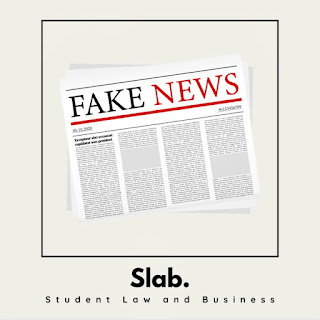Do We Need Laws To Combat The Spread of Fake News?
‘A lie can travel halfway around the world before the truth has a chance to get its pants on'. While researching the origins of Churchill’s quote, I could find no evidence that he actually ever said this, making the quote itself a piece of fake-news of sorts. And so I’m afraid I will start this blog in a more mundane way, without talk of pants…
Open a dictionary, flip to the word ‘lie’ and read the synonyms, among them: untruth, fabricated, and fake. There is no official definition of ‘fake-news’, but I argue it as: ‘statements that were known to be false and yet published as fact’. Is this not the deliberate misleading of others through statements that can be more commonly referred to as lies?
Our democracy is based on the principals of justice and truth and I am, therefore, a strong advocate for the introduction of legislation to combat the spread of fake news. In today's blog, I've decided to share three short points as to why we need laws to stop fake news, with more on this topic next week.
Snap, Send and Share
Social media makes it easier than ever to republish information, and a lack of legislation encourages the chaotic spread of fake news. Click that ‘retweet’ button on Twitter, the ‘share’ button on Facebook, or Instagram, and a story can instantly be viewed across the world.
A recent defamation case invol
Due to a lack of modern legislation, users of social media can be fined for 'sharing' a defamatory article, being held equally liable to its original author. Whether you believe current punitive measures are right or wrong, one point remains the same; be careful what you share on social media. Current laws leave you little protection if you accidentally share a defamatory article, being open to hefty fines.
But, implementing new laws can sound scary and we are often unsure as to whether to introduce what may be seen as a form of censorship, or what could inhibit our freedom of speech by punishing those who publish fake-news. I submit that the need for new legislation is greater than ever not to punish others but rather to protect ourselves, from lies, fines and misinformation.
Referendum Regrets
So while legislation is needed to protect us as individuals, how would legislation protect us a society? This brings me to my second point; fake news threatens the true and fair nature of our modern democracy.
Brexit...yes, I'm sorry, I am going to talk about it. Brexit is a prime example of how fake news stories influenced political votes and thereby affected society through fabricated claims. This was done by both sides, the official leave campaign website published a page named ‘facts about the European Union’ which included false claims about NHS expenditure, with Borris Johnson claiming we send to the EU ‘£350 million pounds a week’. For the stay campaign, David Cameron claimed that, after Brexit, EU immigrants facing six months of unemployment would have to leave Britain, which was also fabricated, fake and completely made up. Whether voting leave or remain, both sides of the Brexit campaigns were guilty of fabricated claims, misinformation and fake-news.
Similar cases have emerged in the US presidential campaigns, with fake-news stories surrounding Donald Trump’s ‘agenda of hate’ influencing what he believed was 2 million voters.
A lack of legislation means a lack of protection for our vote. This left much confusion and misinformation as we voted in the referendum, and until appropriately addressed, will continue to threaten our democracy.
An Intelligent Solution
So, finally, how do we control the spread of fake-news?
So, finally, how do we control the spread of fake-news?
It is possible that laws regulating the urgent spread of fake news would not keep abreast at first due to the scale of the issue. However, new forms of artificial intelligence technology are making the war against fake-news winnable. I’m not just talking about some futuristic Si-Fi technology, these forms of Artificial Intelligence exist and are being used by business’ and even law firms like Clifford Chance (using a program called ‘Kira’) or Slaughter and May (using their program ‘Luminosity’).
England is now trailing, for example, Germany, who are introducing a law to combat fake news, and Facebook is partnering with the German government to use its new artificial intelligence filtering tool.
To Punish or Protect?
The introduction of legislation to combat the spread of fake news is in part about punishing those who wrongfully misinform others through its publication. But it is more about protecting us. Protecting us as an individual from lies, from fines, from confused and misinformed votes. Furthermore, protecting us as a society, encouraging the maintenance and development of modern democracy.
The introduction of legislation to combat the spread of fake news is in part about punishing those who wrongfully misinform others through its publication. But it is more about protecting us. Protecting us as an individual from lies, from fines, from confused and misinformed votes. Furthermore, protecting us as a society, encouraging the maintenance and development of modern democracy.
As perfectly summarised by Mario Cuomo - US politician:
''If you can manipulate the news, a judge can manipulate the law. A smart lawyer can keep a killer out of jail, a smart accountant can keep a thief from paying taxes, a smart reporter can ruin your reputation – unfairly''.
''If you can manipulate the news, a judge can manipulate the law. A smart lawyer can keep a killer out of jail, a smart accountant can keep a thief from paying taxes, a smart reporter can ruin your reputation – unfairly''.
Christian Hughes.



Thank You
ReplyDelete